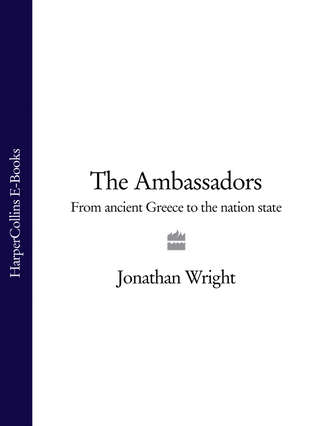
Полная версия
The Ambassadors: From Ancient Greece to the Nation State
He also rescued the papacy from the intrusions of the Lombard kings of northern Italy, conquering Lombard possessions from the German border to the lands south of Rome. The Holy See had a new champion: Charlemagne, the mightiest king in Western Europe. On Christmas Day 800, in the church of St Peter in Rome, Leo III crowned Charlemagne as emperor, heir to the Caesars. The pope, in keeping with tradition, prostrated himself before the new emperor’s feet and the crowds let up a shout. ‘Life and victory to Charles the most pious Augustus,’ they chanted three times, ‘crowned by God, the great and pacific emperor.’11
The future kings and emperors of Western Europe would always dream of emulating Charlemagne’s achievement. Napoleon Bonaparte was no exception. Much like Charlemagne, Napoleon was always well supplied with detractors. One of them wrote a scurrilous, rather far-fetched account of Napoleon’s trip to Aachen, Charlemagne’s ancient capital. Napoleon summoned the entire French diplomatic corps to bear witness to this act of imperial pilgrimage. He apparently visited every spot where Charlemagne had walked, sat, slept, talked, eaten or prayed, dragging the foreign representatives behind him.
Napoleon was apparently so intoxicated by the place that he allowed himself to be duped by local entrepreneurs who, in return for handsome rewards, offered up supposed relics of the great Frankish king – a stone on which Charlemagne had once kneeled, a document bearing his signature, a contemporary portrait, a ring he had worn, a crucifix he had used in his devotions.
One German professor wrote to Napoleon, urging him to be less credulous and suggesting that the portrait was a drawing of this century; the diploma written in the last; the crucifix manufactured within fifty years, and the ring perhaps within ten. Napoleon was not amused and, upon reading the professor’s note, despatched officers to his rooms. They woke the professor, forced him to dress and then bundled him into a covered cart which carried him under escort to the left bank of the Rhine, where he was left with orders, under pain of death, never to return to the French Empire.12
If the story was a fabrication or, at best, an exaggeration, it was one that hinted at just how long a shadow Charles the Great cast over European history. Perhaps only an Arthur or an Alexander bequeathed a more intoxicating legend.
Charlemagne’s diplomatic acumen was certainly part of that legend, but the one thing that medieval Europe enjoyed even more than celebrating its heroes was denouncing Islam. The Song of Roland was the most famous of the medieval chansons de geste (songs of deeds) that flourished from the twelfth century and made such efficient work of denouncing Muslims as duplicitous, avaricious scoundrels. La Chanson de Roland would principally be remembered for its fanciful account of the murder of a heroic Frankish knight at the Pass of Roncesvalles, high in the Pyrenees. It also offered a typically unflattering portrayal of Muslim statecraft, and the Islamic penchant for subverting the protocols of diplomatic encounter. This would prove to be a staple of medieval European discourse. The elephant, sent from Islam to Christianity, was dismissed as an aberration. Muslim ambassadors managing to deceive as mighty an emperor as Charlemagne was surely more representative of Islamic treachery.
At the beginning of the poem, Charlemagne and his armies have been ensconced in Spain for seven years. They have won endless victories, but the town of Saragossa still remains under Muslim control. On his blue marble throne, King Marsile calls forth his counsellors and asks if there is any way to avert military disaster. One of them proposes a devious plan. The king should pretend to submit to Charlemagne. He should reveal that he is willing to be baptized as a Christian in the emperor’s own kingdom, and promise to pay tribute, only to renege once his troops have departed.
Charlemagne will doubtless require hostages as guarantors of payment, and he will likely execute them when he realizes that he has been deceived, but surely this is a price worth paying. Better that the hostages’ heads be shorn away than the Muslims lose the whole of Spain. Marsile chooses ambassadors from among his most cunning followers, and sends them off to Charlemagne on ten snow-white mules, bridled with gold and saddled in silver.
Charlemagne is in high spirits when the Muslim ambassadors arrive. His catapults have recently battered down the walls at Cordoba and a mighty haul of plundered treasure has been secured. All pagans have been slain or made to convert to Christianity. He is relaxing in an orchard surrounded by his 15,000 followers. The older knights are lying on white carpets playing chequers, while the younger squires fence beneath an eglantine-embowered pine tree.
The ambassadors approach him on foot and launch into a fawning address. Marsile will send him lavish gifts – lions, bears, greyhounds and seven hundred camels – provided Charlemagne returns to France.
It is approaching sunset, so Charlemagne tells the ambassadors to tie up their mules and retire to the tents he has provided for them. The next morning, after hearing mass, Charlemagne summons his counsellors to a spot beneath a pine tree to discuss the events of the precious day. Opinion is divided. The knight Roland reminds Charlemagne of a worryingly similar situation seven years earlier, when Marsile had also sent ambassadors bearing olive branches. In reply, two imperial envoys were despatched to the king, only to have their heads severed from their bodies. The Christians have been fighting for seven years, Roland insists, and they should complete their campaign by besieging Saragossa. As Charlemagne clasps his chin and tugs at his beard, another of his advisers suggests that such ‘counsel of pride is wrong’. Receiving Marsile’s homage would be victory enough.
Charlemagne is convinced, and all that remains is the selection of the ambassador to be sent to Marsile. Some are rejected because they would be too dearly missed; Roland is regarded as far too hot-headed for such delicate negotiations. However, he does succeed in nominating his stepfather, Ganelon, one of his harshest critics. Ganelon is far from happy with being chosen for such a treacherous mission. He asks Roland why he would be so wrathful as to nominate his own stepfather and promises that, should he return safely, ‘I’ll follow thee with such force of passion, that will endure so long as life may last thee.’ Roland offers to go in his stead, fully aware that Ganelon would never accept so insulting a proposal. Charlemagne calls Ganelon before him and presents his staff and glove, symbols of his authority, but Ganelon drops the glove – an unhappy omen. And so the ambassador sets out for Sarragossa. The Muslim ambassadors have succeeded in hatching their plan: Charlemagne has been utterly deceived. They have also managed to sow dissent within the Frankish camp, and Ganelon will not forget the treachery of his stepson. He will turn to plotting with the Moorish king and help to bring about Roland’s death.13
The historical Charlemagne was rather less gullible, and he developed an efficient wide-ranging diplomatic apparatus. The Carolingian ambassador – usually referred to as missus or legatus – was a familiar figure throughout the courts of Europe and beyond. Under the Carolingians, there was a steady stream of envoys to Rome, Bulgaria, Constantinople and Scandinavia, to the kings of Northumbria, the emir of Cordoba and the patriarch of Jerusalem. There was no professional diplomatic class, and individuals – whether clerics, palace officials or nobles – were chosen as the need arose. However, there was a tendency to return envoys to places they had previously visited and learned something of: Gervolde, the abbot of St Wandrille on the Seine, for instance, would make several embassies to the English king at Mercia.
There was more to diplomacy than industry, of course. It also demanded glamour. The wonderfully named Notker the Stammerer most likely spent his entire adult life sequestered in a Benedictine monastery. In his biography of Charlemagne, the emperor is portrayed as a master of diplomatic ritual. When a party of Greek ambassadors arrived in Aachen in 812, the palace courtiers decided to have a little sport at their expense. They took turns dressing as the emperor, allowing the envoys to think they were speaking with the mighty Charlemagne. The exhausted Greeks doubtless grew impatient but suddenly, with the appearance of the true emperor, all weariness and irritation evaporated. ‘Charlemagne, of all kings the most glorious was standing by a window through which the sun shone with dazzling brightness. He was clad in gold and precious stones and he glittered himself like the sun at its first rising.’ His sons stood around him ‘like the host of heaven’; next to them his wife and daughters, adorned alike with wisdom and pearls. ‘Had David been in their midst,’ Notker suggested, ‘he would have had every reason to sing out: “kings of the earth and all people, princes and judges; both young men and maidens, old men and children; let them praise the name of the lord.”’ The Greek envoys, overcome by such a majestic sight, ‘fell speechless and senseless to the ground’.
Конец ознакомительного фрагмента.
Текст предоставлен ООО «ЛитРес».
Прочитайте эту книгу целиком, купив полную легальную версию на ЛитРес.
Безопасно оплатить книгу можно банковской картой Visa, MasterCard, Maestro, со счета мобильного телефона, с платежного терминала, в салоне МТС или Связной, через PayPal, WebMoney, Яндекс.Деньги, QIWI Кошелек, бонусными картами или другим удобным Вам способом.



